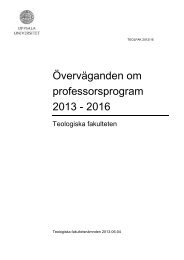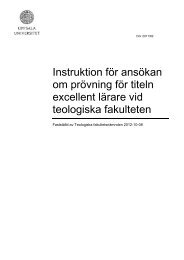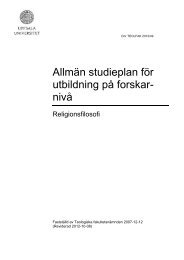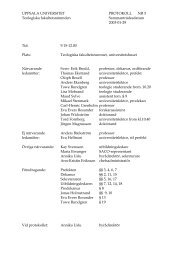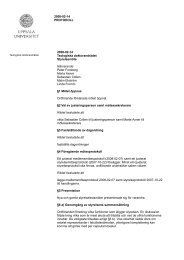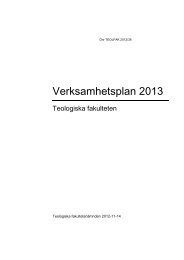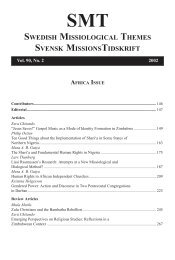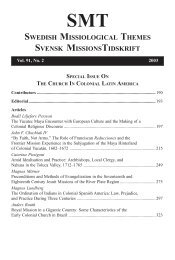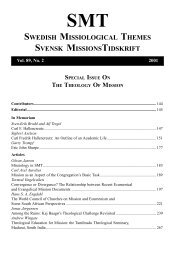SWEDISH MISSIOLOGICAL THEMES SVENSK MISSIONSTIDSKRIFT
SWEDISH MISSIOLOGICAL THEMES SVENSK MISSIONSTIDSKRIFT
SWEDISH MISSIOLOGICAL THEMES SVENSK MISSIONSTIDSKRIFT
Create successful ePaper yourself
Turn your PDF publications into a flip-book with our unique Google optimized e-Paper software.
480 Christopher Steed<br />
language and format. Firstly, SMT gained an English language title along<br />
with its Swedish name, to match its Swedish abbreviation. Secondly, SMT’s<br />
readership has become international, with the switch to publishing most<br />
articles in English. This has allowed Swedish scholars and researchers to<br />
reach an international audience while still publishing in a national, or ‘home’,<br />
periodical. Thirdly, from being mainly connected with the University of<br />
Uppsala, the Editorial Board has expanded to reflect a more nationally<br />
balanced representation of mission studies in Sweden. In particular, this<br />
has meant harnessing the recent growth of the discipline at the University<br />
of Lund, and also appointing members from other Swedish universities<br />
and colleges.<br />
The international character of SMT has similarly attracted our Nordic<br />
missiological colleagues, as it has given them the opportunity to write in an<br />
international language while still permitting them to be published in a<br />
Scandinavian/Swedish journal. This Nordic input has been especially<br />
appreciated, not least the co-operation with the Nordic Institute for<br />
Missionary and Ecumenical Research, whose annual papers SMT have<br />
published during recent years.<br />
SMT has always encouraged scholars and doctoral students from developing<br />
countries to submit papers, especially when it may be difficult for them to<br />
publish their research locally. Every Editor of a periodical has his or her<br />
own specific research interests and academic connections; the present Editor<br />
has particular associations with Africa. This has meant, for example, that<br />
we have been able to publish a large number of articles from Nigerian and<br />
Zimbabwean academics, many of whom may otherwise have been impeded<br />
in having their research disseminated internationally.<br />
It remains for the retiring Editor to express his appreciation for the support<br />
and encouragement he has received since 1995 from SMT’s Editorial Board,<br />
the two Consultant Editors, and the Editorial Secretary. Finally, he wishes<br />
the future Editor much successful and satisfaction in helping to steer SMT<br />
to its centenary.



